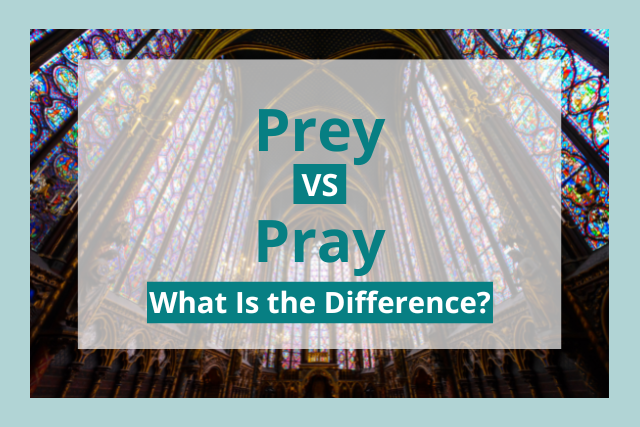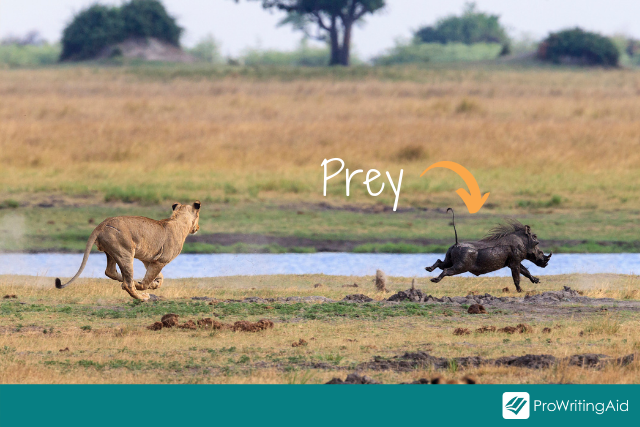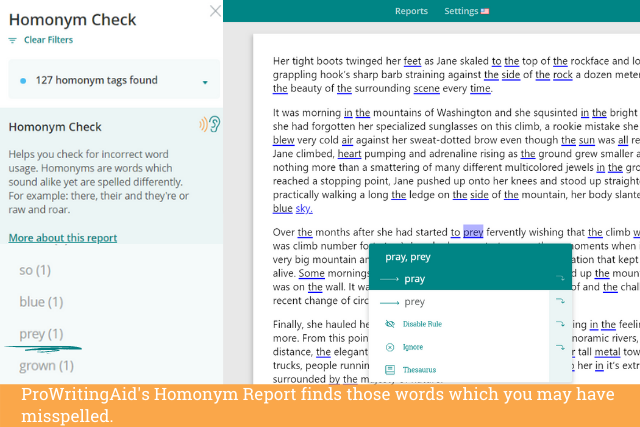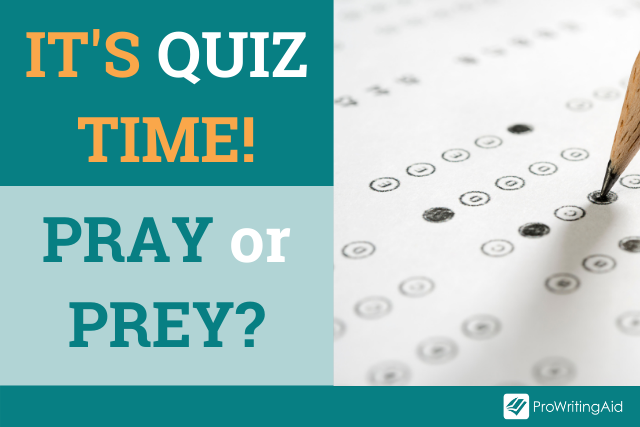
Prey and pray are homophones: they belong to a category of words in which two words sound alike, but have different meanings, origins, or spellings.
Like other homophones, prey and pray are easily confused words. They sound alike and even share three of their four letters. Furthermore, pray and prey are both verbs, though prey can also be used as a noun.
The similarities end there, though. The meanings of the words, even when they are both used as verbs, are completely different.
What Do Prey and Pray Mean?
What Does the Word Pray Mean?
Pray is a verb. It has two common meanings:
- to speak to a god, either in a religious ceremony in order to express love, admiration, or thanks; or in order to ask for something
- to hope for something very much
(Definitions from cambridge.org)
What Does the Word Prey Mean?

Prey can be used as either a noun or a verb.
As a noun, prey has two common meanings:
- an animal taken by a predator as food
- one that is helpless or unable to resist attack
(Definitions from merriam-webster.com)
It’s easy to see that these meanings are related. Prey, when used as a noun, refers to something that is vulnerable and hunted by a predator.
Prey as a verb means:
- to seize and devour prey
- to make raids for the sake of booty
- to have an injurious, destructive, or wasting effect
(Definitions from merriam-webster.com)
As with the meanings of the noun prey, the verb-form meanings also have a common thread. Prey, in all of its verb-form definitions, involves the act of hunting for the sake of taking—whether the taking is for food, personal wealth, or control.

Using Prey and Pray In a Sentence
How to Use Pray in a Sentence
If you’ve ever been to a religious service or ceremony, you’ve probably heard the worship leader say, “Let us pray.” That’s one of the more common sentences using pray.
Here are additional examples of pray used as a verb in the context of a religious event or experience:
- I will pray to (enter the name of your higher power) for guidance and comfort.
- Please pray for a positive outcome.
- We need to pray for an end to world hunger.
- Devout believers pray without ceasing.
The following examples demonstrate the use of pray as a verb expressing the action of hoping for something.
- I pray the weather holds up.
- I pray they get home safely.
- I pray we get there in time.

While the second set of examples focuses on the act of hoping, the speaker could actually be incorporating both definitions into their use of pray.
The speaker may simply be hoping for good weather, or may also be praying, in the spiritual sense, that their higher power provides that good weather. Making the distinction in meaning isn’t necessary, though, for understanding the speaker’s overall intent.
How to Use Prey in a Sentence
Predators, or hunters, stalk their victims—their prey. That’s the context for using prey as a noun.
Examples of prey used as a noun:
- The lion hunts for prey at night.
- The celebrity was prey for the paparazzi.
- He’s so trusting. He’s easy prey for a con artist!
The act of the predator— hunting or stalking— is the context for using prey as a verb. Usually, it is followed by the word “on” or “upon.” For example:
- Lions prey upon gazelles.
- Anxiety preys on my mind.
- Scammers prey on the most vulnerable members of society.
- They preyed on my fragile emotional state and convinced me to give them money.

Forms and Tenses for Prey and Pray
Verb Tenses of Pray
Infinitive: To pray
Present: Prays
Past: Prayed
Future: Will pray
Participle: Has, have, had prayed
The noun form of pray is prayer and the plural form of that noun is prayers. For example:
- We offered a prayer of worship.
- We offered prayers of praise.
- Our prayers have been answered.
- Let’s pray a prayer of thanksgiving.

Generally, the word prayer (pronounced PRAY-er) is not used to identify a person who is praying, at least not formally. Terms referring to people who pray include “worshipper,” “supplicant,” and “petitioner.”
Verb Tenses of Prey
Infinitive: To prey
Present: Preys
Past: Preyed
Future: Will prey
Participle: Has, have, had preyed
Plural Form of Prey (Noun)
The plural form of the noun prey remains prey. A lion may hunt a zebra as prey, or a lion may hunt three zebras as prey. The zebra is prey and the zebras are prey.
Helpful Tricks to Remember How to Use Prey and Pray
The a in pray: the words “ask” and “adoration” start with “a” and are words often used to describe the function of prayer. When they pray, supplicants ask for help or peace or forgiveness, or express adoration to the receiver of their prayers.
The e in prey: the words “eat,” “eliminate,” and “exploit” start with “E” and describe what many predators do with their prey. The lion eats the zebra. The killer eliminates its victim. The manipulator exploits its target.
Is it Preying Mantis or Praying Mantis?

Praying to the Porcelain God
Have you ever heard, or had, or been the subject of a conversation like this?
Jack: Hey Jill! Where’s Joe today?
Jill: He’s at home praying to the porcelain god.
Jack: Ugh—out too late or a stomach bug?
Poor Joe isn’t at home literally praying to a god of porcelain. “Praying to the porcelain god” is an idiom, a bit of a play on words, and means he’s at home kneeling—as a supplicant might kneel before a god or altar—before his toilet as he vomits. This is a prayer session it’s best to avoid.
The Family that Prays Together Stays Together
This saying doesn’t mean families who pray together will live in the same house forever. Rather, it implies that families who pray and follow worshipful practices together will be emotionally and spiritually healthy, with strong, unbreakable family ties.
Pray Over or On (Something)
To pray over something means to pray for or about that issue, person, etc. You could “pray over” a person who is ill or “pray on” an important decision.
Pray Tell
This is an archaic expression, really only used in fun nowadays. Perhaps you recognize it from some of Shakespeares’s plays. The “pray” in this phrase departs from the verb-form definition of pray and means “please” infused with a tone of urgency.
“Pray tell” essentially means “Please tell me!” For example: “Why didn’t you meet me as we planned, pray tell?”
Praying Mantis
The Praying Mantis is an insect “named for its prominent front legs, which are bent and held together at an angle that suggests the position of prayer.” (nationalgeographic.com)
Interestingly, the Praying Mantis is also a formidable predator, preying upon moths, crickets, flies, and other insects (including other Praying Mantids), so it’s easy to understand why the spelling error “Preying Mantis” commonly occurs.
Easy Prey
When someone or something is “easy prey” it means they or it are especially vulnerable: an easy target. For example: “His inability to think critically makes him easy prey for the empty promises of politicians.”
Fall Prey To
If someone “falls prey to” something or someone else, it means they have been exploited or victimized. For example:
- It’s becoming more common for people to fall prey to the sophisticated tricks of identity thieves.
- He fell prey to the ticket scam. The ones he purchased online were phony!
ProWritingAid’s Homonym Report
Telling the difference between words that sound the same may be pretty hard, but ProWritingAid has you covered.
ProWritingAid’s Homonyn Report helps you find words that are easily confused: homophones, homonyms, and homographs, so you can be sure that you've used the right one.
Regular spellcheckers can miss these errors; ProWritingAid’s Homonym Report won’t let you down!

Examples of Prey and Pray In a Sentence
Pray
“Glasgow worshippers pray at St Simon's in Partick after fire.” (Hamish Morrison; heraldscotland.com)
“The Denmark players, some of them crying and others praying, then formed a circle to shield Eriksen from view as the medical teams administered urgent care.” (Andrew Das, nytimes.com)
Prey (Noun)
“Not all predators are animals. Carnivorous plants, such as the Venus flytrap and the pitcher plant, consume insects. Pitcher plants catch their prey in a pool of water containing digestive enzymes…” (Stevens, nature.com)
“Teaching is a rewarding yet demanding career. With long hours and a heavy workload, it's easy to fall prey to teacher burnout.” (Fiona Tapp, Hey Teach!)
Prey (Verb)
“We commonly hear about scammers preying on senior citizens, but one savvy grandma called out a fraudster before he swindled her.” (L. Victory, Chicago, CBS Local)
“Manipulative people can be passive-aggressive or nice one minute and standoffish the next, to keep you guessing and to prey on your fears and insecurities.” (Abigail Brenner, M.D; Psychology Today)
Take the Quiz!

Put your newfound pray vs prey expertise to the test! Determine whether pray or prey completes the sentence. You may need to use different verb tenses.
Before we eat, let’s .............. to give thanks for the food.
He’s very upset. Relationship problems have been .............. on his mind.
The gangs .............. upon the neighborhood, making everyone live in fear.
I hope you heal quickly; I’ll be .............. for you.
Humans are not natural .............. for sharks, but I’m still not going in the water!
I’m sorry I hurt you and .............. you can forgive me.
He .............. on rich, lonely men and women, convincing them he cares for them, when all he wants is access to their wealth.
She .............. at the church every day.
He’s a predator, a serial killer. He sees unsuspecting victims as .............. .
We fell .............. to their slick advertising and spent good money on a bad product.
BONUS: If you fear someone is .............. upon you as if you are .............. , .............. for a way to escape.
ANSWERS:
- pray
- preying
- prey / preyed
- praying
- prey
- pray
- preys
- prays
- prey
- prey
BONUS: preying, prey, pray
Keep On Learning
I pray you did well on the quiz! If you need more review, read through the examples again, be on the lookout for uses of pray/prey in whatever you read, and remember to lean on the ProWritingAid Homonym Report for continued support.

